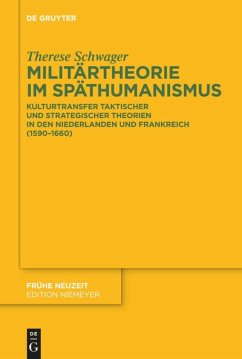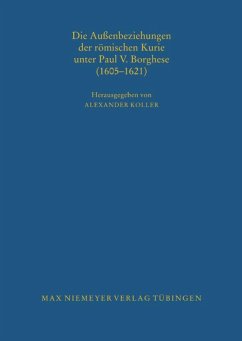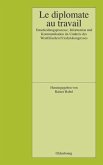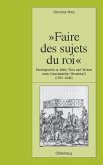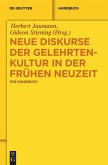This book deals with the connection of humanism and the military based on the cultures in the Netherlands (Low Countries) and France in the late 16th and the 17th century. The cultural transferral processes of ancient military theory in the context of late humanistic culture of scholarship are disclosedin the reacquisition of ancient tactical and strategic teaching traditions. Generally emphasis is placed on Justus Lipsius â?? in this case an abundance of further theorists and texts are included: such as Claude Saumaise, Gabriel Naude, Henri de Rohan and Richelieu.
This work applies a revisionist structure by correcting the foreshortenings of the Oestreich school with regard to the embedding of the military reform of the House of Orange in the political neo-stoicism and the thesis of social disciplining, as well as the interpretation of the military revolution.
Das vorliegende Buch nimmt die Verbindung von Späthumanismus und Militärtheorie anhand der zentralen Kulturen der Niederlande und Frankreich in den Blick: Die Gelehrten konzeptualisierten an den Naht- und Schnittstellen militärpolitischer Kulturen und waren in die Konstitutionszusammenhänge antiquarischen Wissens eingebunden. Unter dem Gesichtspunkt interner Brüche und Synergien in der späthumanistischen Gelehrtenrepublik werden neben anderen die Werke von Justus Lipsius, Joseph Scaliger, Isaac Casaubon, Claude de Saumaise und Gabriel Naudé sowie die philologisch-antiquarische Praxis im 'Kabinett' der Brüder Dupuy und bei Claude Fabri de Peiresc beleuchtet. Militärs und Politiker wie die Nassau-Oranier, Henri de Rohan, René Lenormant und Kardinal Richelieu sind in den Transfer und die Kommunikation taktischer und strategischer Lehren eingebunden. Damit sind Querverbindungen zwischen strategischen Konzeptionen, politischer Pragmatik und späthumanistischer Gelehrtenkultur zu konstatieren. In diesem Kontext wird die philologische und antiquarische Tradition stärker berücksichtigt als bisher geschehen, die Verengung auf den theoretisch-praktischen Reformkomplex der Heeresreform der Oranier aufgebrochen und dessen Schlüsselstellung in der Argumentation von Staatsbildung, Sozialdisziplinierung und Militärischer Revolution relativiert. Statt einer einfachen Antikerezeption und statt einer Rezeption der oranischen Heeresreform in Frankreich ist ein komplexer Kulturtransfer strategischer und taktischer Theorien zu veranschlagen, der im Kontext der frühneuzeitlichen Pluralität von Methoden, Wissensordnungen und Lehren zu sehen ist. Besonders in den Blick genommen wird eine Revision antiker militärtheoretischer Tradition und moderner Kommentare im Kontext eines zwischen Frankreich und den Generalstaaten abgeschlossenen Militärbündnisses und während der französisch-schwedischen Phase des Dreißigjährigen Kriegs.
This work applies a revisionist structure by correcting the foreshortenings of the Oestreich school with regard to the embedding of the military reform of the House of Orange in the political neo-stoicism and the thesis of social disciplining, as well as the interpretation of the military revolution.
Das vorliegende Buch nimmt die Verbindung von Späthumanismus und Militärtheorie anhand der zentralen Kulturen der Niederlande und Frankreich in den Blick: Die Gelehrten konzeptualisierten an den Naht- und Schnittstellen militärpolitischer Kulturen und waren in die Konstitutionszusammenhänge antiquarischen Wissens eingebunden. Unter dem Gesichtspunkt interner Brüche und Synergien in der späthumanistischen Gelehrtenrepublik werden neben anderen die Werke von Justus Lipsius, Joseph Scaliger, Isaac Casaubon, Claude de Saumaise und Gabriel Naudé sowie die philologisch-antiquarische Praxis im 'Kabinett' der Brüder Dupuy und bei Claude Fabri de Peiresc beleuchtet. Militärs und Politiker wie die Nassau-Oranier, Henri de Rohan, René Lenormant und Kardinal Richelieu sind in den Transfer und die Kommunikation taktischer und strategischer Lehren eingebunden. Damit sind Querverbindungen zwischen strategischen Konzeptionen, politischer Pragmatik und späthumanistischer Gelehrtenkultur zu konstatieren. In diesem Kontext wird die philologische und antiquarische Tradition stärker berücksichtigt als bisher geschehen, die Verengung auf den theoretisch-praktischen Reformkomplex der Heeresreform der Oranier aufgebrochen und dessen Schlüsselstellung in der Argumentation von Staatsbildung, Sozialdisziplinierung und Militärischer Revolution relativiert. Statt einer einfachen Antikerezeption und statt einer Rezeption der oranischen Heeresreform in Frankreich ist ein komplexer Kulturtransfer strategischer und taktischer Theorien zu veranschlagen, der im Kontext der frühneuzeitlichen Pluralität von Methoden, Wissensordnungen und Lehren zu sehen ist. Besonders in den Blick genommen wird eine Revision antiker militärtheoretischer Tradition und moderner Kommentare im Kontext eines zwischen Frankreich und den Generalstaaten abgeschlossenen Militärbündnisses und während der französisch-schwedischen Phase des Dreißigjährigen Kriegs.

